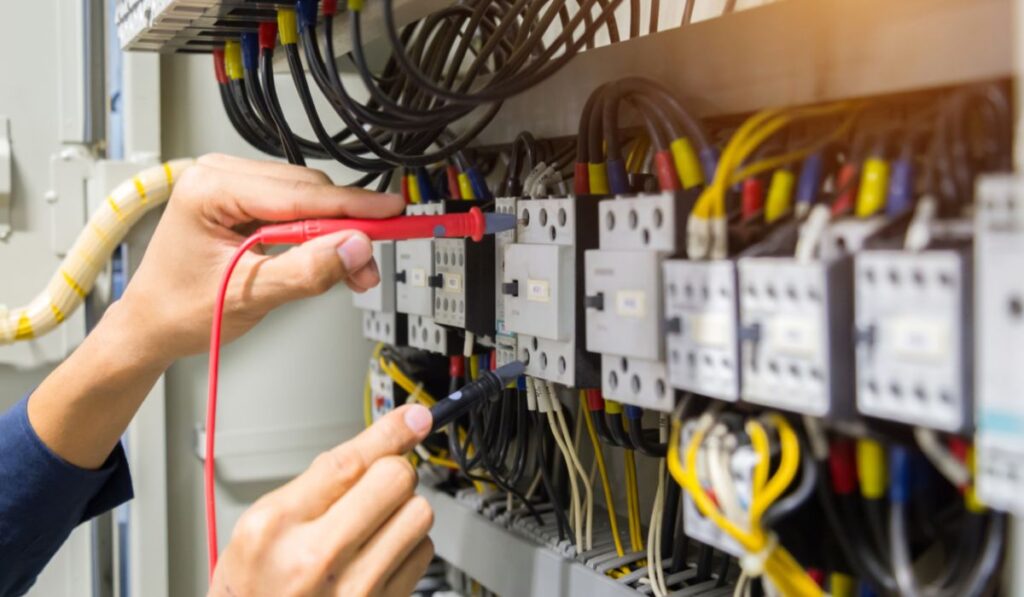Determining whether it’s time to get electrical rewiring services depends on several factors related to the age, condition, and safety of your home’s electrical system. Here are some signs that might indicate it’s time to get Electrical Rewiring Services:
Frequent Electrical Issues:
If you’re experiencing frequent electrical problems such as tripped circuit breakers, flickering lights, or outlets that don’t work correctly, it could be a sign of underlying wiring issues.
Outdated Wiring:
Homes with outdated knob-and-tube wiring, aluminium wiring, or cloth-insulated wiring are at a higher risk of electrical hazards. Upgrading to modern wiring systems is safer and more efficient.
Burn Marks or Smells:
If you notice burn marks on outlets, switches, or electrical panels, or if you detect a burning smell when using electrical appliances, it’s a severe indication of wiring problems.
Warm or Hot Outlets:
Outlets that feel warm to the touch or produce heat are signs of overloading or faulty wiring. This could pose a fire hazard and should be addressed promptly.
Frequent Tripped Circuit Breakers:
If your circuit breakers are frequently tripping, it might indicate that the electrical system is struggling to handle the demand, which could be due to outdated or insufficient wiring.
Buzzing Sounds:
Unusual buzzing or crackling sounds from outlets, switches, or the electrical panel could indicate loose or damaged wiring.
Flickering Lights:
Lights that constantly flicker, dim, or brighten without any apparent reason could result from wiring issues.
Charred Outlets or Switches:
Charred or discoloured outlets and switches indicate overheating and should be addressed immediately.
Safety Concerns:
If your home’s wiring is not up to current safety standards, rewiring can align with modern safety requirements and reduce the risk of electrical accidents.
Renovation or Remodeling:
If you plan to renovate or remodel your home, it’s an excellent time to assess the wiring. Adding new appliances or expanding your living space might require an updated electrical system.
Aging Home:
If your home is several decades old and has never undergone rewiring, it’s a good idea to inspect the wiring by a professional electrician.
Frequent Trips to the Electrician:
If you frequently call an electrician to address various electrical issues, it might be more cost-effective to consider a comprehensive rewiring.

Guidelines for Ensuring Safety During the Rewiring Process:
Staying safe during a rewiring process is crucial to prevent accidents and ensure the well-being of everyone involved.
Hire a Professional:
Rewiring is a complex task that a licensed and experienced electrician should handle. Attempting to rewire your home without the necessary expertise can be dangerous.
Must Read: How to Find the Right Electrician for Your Home
Turn Off the Power:
Before any work begins, turn off the power to the rewired area. Ensure the circuit breakers are switched off and the power is locked out to prevent accidental electrocution.
Use Proper Tools and Equipment:
If you’re working on a DIY project that involves electrical work, use the right tools and equipment designed for electrical tasks. Insulated tools, voltage testers, and safety gear are essential.
Test for Live Wires:
Before touching any wires, use a voltage tester to ensure they are not live. Even after turning off the power, double-checking for live wires is essential.
Follow Safety Codes:
Adhere to your area’s electrical safety codes and regulations. These guidelines are in place to ensure safe electrical installations.
Plan the Work:
Have a clear plan for the rewiring process. Identify the areas that need rewiring, and make sure you understand the layout of the electrical system.
Keep Work Area Dry:
Ensure the work area is dry and moisture-free to prevent electrical shorts and hazards.
Avoid Overloading Circuits:
During the rewiring process, avoid overloading circuits. Distribute the load evenly across circuits to prevent electrical fires.
Label Wires:
If you’re disconnecting wires, label them clearly to avoid confusion when reconnecting. This is especially important if the rewiring process spans multiple days.
Properly Ground Wires:
Grounding is essential to prevent electrical shocks. Make sure all wires are properly grounded according to safety standards.
Install GFCIs:
If your rewiring involves areas near water sources, install Ground Fault Circuit Interrupters (GFCIs) to protect against electrical shocks.
Test After Completion:
Once the rewiring is complete, test all outlets, switches, and fixtures to ensure they function correctly and safely.
Have an Emergency Plan:
In case of any accidents or emergencies, have a clear plan. Keep fire extinguishers nearby and know how to shut off the power to your home.
Electrical work can be dangerous, and safety should be your top priority. With a deep commitment to excellence, Ohmatic Electrical brings expertise and a customer-centric approach to every project we undertake.

